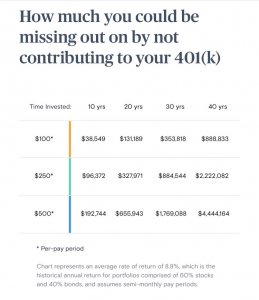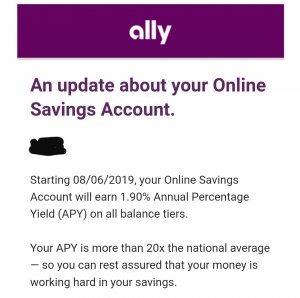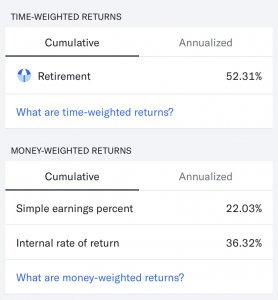I just joined Vanguard over the weekend after some research and funded the account. I have some questions about contributions and distributing funds. So the maximum I can contribute per year is $5,500? What happens if I put any more than that? Any way I can put in $100k from the get go or can I only contribute $5,500 for 18 years to reach $100k? I don't want to actively manage, but maybe rebalance occasionally as needed. Do I pick individual stocks or index funds? Do I go 100% stocks or have bonds in the mix, since I'm still fairly young? Any specific index funds I should look at at Vanguard? I was thinking maybe an 90/10 or 80/20 split stocks/bonds. From research, I've read it's best to find index funds with low costs and fees. I guess it's also called Expense Ratio. Anything else I need to know?
I'm still very new at this. I'm going to spend some time reading through this entire thread and take notes. I'm also spending time reading on Bogleheads about lazy portfolios and the two-fund, three-fund, and four-fund portfolios. Anywhere else I can get more information? Thanks in advance!
First of all, congrats on getting your finances right and deciding to diversify. I'm only vaguely familiar with the RE side of things (I'm curious about investment properties, but haven't made the time to research deeply enough to put too much skin in the game besides my own place), but as for the retirement/IRA side of things, this is what I'd recommend in terms of your questions.
Note, this is just my personal knowledge and understanding and way of doing things, I'm not a financial professional/expert by any means. I just wrote this off the cuff because I accumulated this knowledge and wanted to share with y'all NT fam. If you find contradictory information or knowledge, I'd appreciate any dialogue.
In terms of IRA's, you have 2 ways to go: Roth (post-tax, money you've been taxed on, you can withdraw later without taxes, under current tax laws) or Traditional (pre-tax, you're not taxed on this today, will be taxed when you withdraw, however, there may be ways around this, some info here:
https://www.madfientist.com/traditional-ira-vs-roth-ira/). Technically, each one has a cap of $5500 in terms of contributions, as long as you're under age 50 and make less than ~$120k adjusted gross income. If you're over 50, you can make catch up contributions and contribute $6500.
There is a way to get your $100k into an IRA, but that involves a mega backdoor Roth IRA contribution. Here's one breakdown of it that I like and find helpful:
https://www.madfientist.com/after-tax-contributions/
As for index funds or individual stocks, the answer is it depends... It's involves personal preference, risk tolerance, personal emotional control, and financial goals. Predominant school of thought right now is going to be majority index funds, it's a bit of set it and forget it, the slow cooker of investing in the stock market. You probably already know this but one of the premier investors in the world, Warren Buffett, advocates for people to just stick their money in the S&P500 and roll with the US economy. He just won a bet by backing the S&P 500 against some hedge fund pickers. Also, I believe his advice for his family was to put their money in the S&P 500 should he pass away. There are schools of thought that advocate for creating your own index, if you want to be more proactive and make value plays (ie buying low, etc.) and picking stocks on your own, which would involve more work, research, discipline, etc.
As for allocation, in terms of 100% or mix, there's different schools of thought there too. Common knowledge would say to have a balance of stocks and bonds based on age since bonds are historically less volatile and provide a steady income, which is something you want as you're older and relying on the cash, whereas stocks are much more volatile and returns aren't as steady. The reason it's advisable to pursue a higher allocation of stocks while you're younger is the returns of stocks can be higher, anywhere from 7-10% when looking at a timeline of decades, whereas bonds are in the 2-5% range. Personally, I went 100% since I tried the split and after a while, I felt like I didn't care about the stability of bonds and could tolerate the stock volatility since I wouldn't be touching the money for decades. One way to go would be to try a 90/10 or 80/20 and re-allocate as you feel comfortable.
As for fees, yep, go with lower cost and fees, unless the returns and index composition (what stocks the index fund buys and holds) are attractive enough to pay a higher premium. At Vanguard, you're their client and shareholder, so their financial prerogative is to make money for their clients, so they tend to have the lowest index fund fees. This guy has a good stock series that breaks things down pretty well:
http://jlcollinsnh.com/stock-series/ and he's a big fan of Vanguard. I'm personally with them too and have had good experiences with their index funds. Bogleheads is a great place for index fund investors and there's a strong, helpful community there.
As for additional resources beyond the ones linked, "The Intelligent Investor" and "Security Analysis" by Ben Graham, influential for individual stock valuation if you decide to go that route. "Bogleheads guide to investing," for the index fund argument. I can't think of others off the top of my head right now.
I didn't think it'd become this wall of text, but I wanted to answer some of your questions. Lunch break wrapping up and I gotta get back to work, but feel free to reach out if you have any questions or wanna chat. Wish y'all the best, NT fam.

















